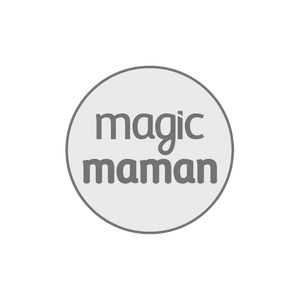
Breastfeeding and Return to Work: Reconciling the Two Worlds
Share
Introduction
Breastfeeding is a precious act that offers countless health benefits for both baby and mother. It is recognized as one of the most natural and beneficial ways to nourish a newborn, providing essential nutrients, strengthening the immune system, and fostering a deep emotional bond between mother and child. However, for many mothers, returning to work can be a challenge in continuing this practice. In this article, we will explore strategies and tips for mothers to successfully balance breastfeeding and their professional lives, ensuring a smooth transition back to the world of work while continuing to provide the best for their child.
1 - Planning before returning to work:
Even before returning to work, mothers who want to continue breastfeeding must make important decisions and develop a solid plan. The first step is to determine whether you want to continue breastfeeding after returning to work. This decision is personal and will depend on a variety of factors, including your own comfort, your baby's needs, and the demands of your job. Once this decision is made, it is essential to create a plan of action. This includes setting clear goals, such as how often you want to breastfeed or express milk at work , as well as finding solutions to overcome potential obstacles. Finally, it is essential to know your rights as a breastfeeding mother at work . Laws and regulations vary from country to country, but many jurisdictions protect the right of mothers to breastfeed or express milk at work. Familiarizing yourself with these rights can help you negotiate with your employer and create a supportive environment for breastfeeding at work .
By planning carefully before returning to work, you can increase your chances of success in this important endeavor for your baby's health and your personal well-being.
2 - Expressions and storage of breast milk" by addressing the different points:
Once you've decided to continue breastfeeding after returning to work, mastering the art of expressing milk becomes essential. A breast pump is the key tool in this process. There are different types of breast pumps, both manual and electric, each with its own advantages. Learning how to use them effectively is crucial to ensuring your baby receives a regular supply of breast milk.
Expressing techniques vary from mother to mother, but it's important to familiarize yourself with the methods that work best for you. When expressing milk, it's recommended to gently stimulate the breasts using steady pressure to promote optimal flow.
Once you've expressed your milk, you need to make sure you handle it properly. Breast milk must be stored hygienically and safely to preserve its nutritional properties. Store the milk in specially designed bottles or storage bags, making sure to label them with the collection date. Follow storage guidelines for room, refrigerator, and freezer temperatures.
To organize your work around expressing milk , it's important to communicate clearly with your employer and coworkers. Schedule expressing times that fit well into your schedule. Create a private and comfortable space for expressing milk, if this isn't already provided by your employer. Make sure you have all the necessary equipment, including a refrigerator for temporary storage of expressed milk.
By mastering breast pumping and following proper storage procedures, you can ensure your baby always receives the breast milk they need, even when you're not physically present. This essential skill will allow you to successfully maintain breastfeeding while you return to work.
3 - Create a breastfeeding-friendly work environment:
To maintain successful breastfeeding after returning to work, it is essential to create a supportive work environment that supports this decision. Here are some key things to consider:
- Educating employers and colleagues: It's important to educate your employer and colleagues about the importance of breastfeeding and your desire to continue feeding your baby with your own milk. Open communication is key. Talk to your employer about your needs to express milk at work and discuss how it can be incorporated into your schedule. The more informed and understanding your employer is, the more likely they are to support your approach.
-
Creating a dedicated space for pumping at work: Ideally, your workplace should have a suitable and private space for pumping. This space should be equipped with a comfortable chair, a table to place your pumping equipment, and access to electricity. Make sure this space is clean and well-maintained. If your workplace doesn't offer such a facility, talk to your employer about creating a suitable space.
3 - Return to Work Planning: Flexible Schedules and Breastfeeding Breaks: A key element to successfully breastfeeding while working is planning. Talk to your employer about flexible schedules that allow you to take breaks to express milk. By organizing your breaks to fit your baby's needs, you can continue to breastfeed your child while meeting your work obligations.
By creating a breastfeeding- friendly work environment, educating your employers and colleagues, setting up an appropriate space for expressing milk, and carefully planning your schedule, you can increase your chances of successfully balancing work and breastfeeding in a way that is harmonious and beneficial for you and your baby.
4 - Maintaining the supply of breast milk" by addressing the different points:
One of the major challenges for breastfeeding mothers after returning to work is maintaining a sufficient supply of breast milk to meet their baby's needs. Here are some essential tips to help you achieve this:
1 - The importance of regularity in expressing milk:
Consistency is key to maintaining an adequate breast milk supply. Try to express your milk at the same times you breastfeed your baby when you are at home. Stick to a regular pumping schedule at work to boost production. The more consistent your routine, the better your body will be able to adapt to the demand for milk.
To learn more about methods and tips for storing breast milk, I invite you to consult our article here.
2 - Feeding the baby with breast milk during working hours:
Make sure your baby receives breast milk during your working hours. If possible, arrange for your child to be cared for by a trusted person who can give them breast milk from a bottle. If you can't secure this option, you may need to express enough milk during the day to cover your baby's needs while you're away. This can be a delicate balance, but consistency and communication with your baby's caregiver are essential to ensuring adequate feeding.
3 - Prevent a drop in milk production:
A decrease in milk supply can be a concern for many mothers returning to work. To avoid this, be sure to maintain a balanced diet, stay hydrated, and get enough rest. Using your breast pump effectively and consistently is also essential. If you notice a decrease in milk supply, don't hesitate to consult a healthcare professional or lactation consultant for additional advice and support.
By following these tips, you can maintain an adequate breast milk supply while working, allowing you to continue providing your baby with the many benefits of breastfeeding, even during your working hours.
5 - Managing emotions and stress related to returning to work" by addressing the different points:
Returning to work after the birth of a baby can be an emotional and stressful time for many mothers. It is essential to recognize these challenges and put strategies in place to manage them effectively:
- Feelings of guilt and anxiety: Many mothers experience feelings of guilt when they return to work while continuing to breastfeed. They may wonder if they are spending enough time with their baby or providing enough breast milk . It's important to remember that every family and situation is unique. Guilt is normal, but it's essential to recognize that you are doing your best to balance your roles as a mother and an employee.
- Social support: family, friends, and support groups: During this transition period, social support plays a crucial role. Talk openly about your emotions with your partner, family, and close friends. They can offer valuable emotional support and remind you that you are not alone in this journey. Joining a breastfeeding or parenting support group can also connect you with other mothers going through similar experiences and share valuable advice.
- Taking care of your mental health during the transition period: Returning to work can be stressful, but it's important to take care of your mental health. Allow yourself time for relaxation and self-care. This can include meditation, yoga, reading, or any other activity that helps you relax. If you're experiencing significant emotional distress, don't hesitate to consult a mental health professional. Your mental well-being is essential for your own health as well as that of your baby.
Managing the emotions and stress of returning to work while maintaining breastfeeding can be challenging, but with the right support and awareness of your own emotional needs, you can navigate this transition period in a more peaceful and balanced way. Remember that you are doing your best to support your baby while continuing your career, and that is worth celebrating.
6 - Breastfeeding and returning to work: the advantages"
Continuing to breastfeed after returning to work has many benefits for both mother and baby. Understanding these benefits can help motivate mothers to continue breastfeeding while juggling work responsibilities:
- Benefits of Extended Breastfeeding : Extended breastfeeding, even after returning to work, offers a wide range of health benefits for the baby. Breast milk continues to provide essential nutrients, antibodies, and growth factors that strengthen the child's immune system. In addition, it is associated with superior cognitive development and a reduced risk of long-term chronic diseases.
- Strengthening the mother-child bond despite separation at work: Breastfeeding offers a unique opportunity for mother-child bonding. Even while working outside the home, expressing milk and providing this precious liquid to your baby maintains a strong emotional bond. Breastfeeding or bottle-feeding moments become special occasions for bonding and establishing a deep emotional connection.
- Reduced baby feeding costs : Breastfeeding is cost-effective. By continuing to breastfeed after returning to work, mothers can significantly reduce the costs associated with baby feeding, such as purchasing infant formula. This can represent significant savings on the family budget.
In summary, breastfeeding after returning to work offers significant benefits for the baby's health, the mother-child bond, and family finances. These benefits are worth considering when deciding whether to continue breastfeeding while pursuing a professional career. It's important to remember that every mother has the power to choose the best option for herself and her baby based on her needs and priorities.
Conclusion
In this article, we explored one of the challenges many mothers face: breastfeeding after returning to work . We looked at various aspects of this approach, from the health benefits for both baby and mother to managing breast milk and creating a supportive work environment. Here are the key takeaways:
We've highlighted the importance of consistent milk expression to maintain an adequate supply, as well as the importance of feeding your baby breast milk during labor hours. Preventing a drop in milk supply is essential to ensure your baby continues to benefit from this precious food.
We also addressed the emotional challenges of returning to work, such as guilt and anxiety, and encouraged mothers to seek support from family, friends, and breastfeeding support groups. Taking care of your mental health during this transition period is essential for a positive experience.
Finally, we highlighted the benefits of breastfeeding after returning to work, including strengthening the mother-child bond and reducing the costs of feeding the baby. These benefits are worth considering when making your decision.
To all the mothers considering continuing breastfeeding after returning to work, we want to say: you are incredible! Your dedication to your baby's health and well-being deserves to be celebrated. Every journey is unique, and there is no one-size-fits-all answer. Whether you choose to breastfeed at work or not, your love and commitment to your child are invaluable.
We also encourage you to share your experiences with other mothers and seek support on your journey. Whether it's from breastfeeding support groups, healthcare professionals, or loved ones, remember that you are not alone in this journey. Together, we can support and inspire other mothers to follow their own breastfeeding paths while pursuing their professional careers.
We wish you all much success, happiness, and well-being in your roles as mothers and professionals. Thank you for joining us on this article, and may your journey be filled with love and success.






















